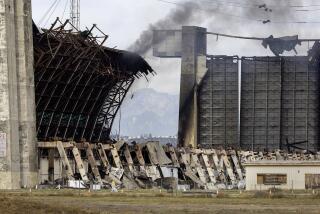Turning Base to Shelter Not That Easy
- Share via
* The Times had a front-page story (“Homeless May Find Shelter at Tustin Base” Aug. 17) about agencies wanting to establish facilities for the homeless when the Marine Corps Air Station in Tustin closes in 1997.
The Times article correctly described the requirements of the federal McKinney Act. It does mandate that the departments of Defense, Housing and Urban Development, and Health and Human Services give priority consideration to homeless agencies when a military base is closed.
The McKinney Act was originally intended to deal with surplus federal buildings or small parcels of land.
With federal policy now focusing on closure of military bases, the act has taken on a new dimension.
Whether or not Congress will amend it to deal with the unique circumstance presented by the closure of large military bases remains to be seen.
Tustin cannot ignore the McKinney Act while preparing the reuse plan for the air station.
What the city is doing is cooperating with federal agencies to ensure that obligations imposed by the McKinney Act are realistic and compatible with the reuse plan for the air station.
It is important to keep in mind that Congress’ decision to close the air station was based on the Marine Corps’ operational needs and the opportunity to convert the air station site to economically productive private sector uses.
Tustin has been encouraged by the federal government to deal with McKinney Act requirements on a proactive basis. That does not mean an open-ended invitation for homeless facilities at the air station.
It means the city will take into account early in the process of preparing a reuse plan the federal mandate that the city, the Marine Corps and other federal agencies must comply with the McKinney Act. Any organization wanting to locate a facility for the homeless on the air station must meet rigorous standards that ensure a facility is well managed and an asset, not a detriment to the community.
The city has two choices: It can ignore federal law and the advice of federal agencies while preparing a reuse plan for the air station, or it can ensure that a balance is achieved between the requirements of the McKinney Act and an economically viable reuse plan. Early resolution of the issue will accelerate the goal of an adopted reuse plan that puts the site to productive uses, creates employment opportunities and meets the requirements of federal law.
Ignoring federal law and the opportunity to work cooperatively with federal agencies responsible for the McKinney Act would take the issue entirely out of the hands of the city. That would not be in the best interest of Tustin’s residents.
WILLIAM A. HOUSTON
City Manager
Tustin
More to Read
Sign up for Essential California
The most important California stories and recommendations in your inbox every morning.
You may occasionally receive promotional content from the Los Angeles Times.






